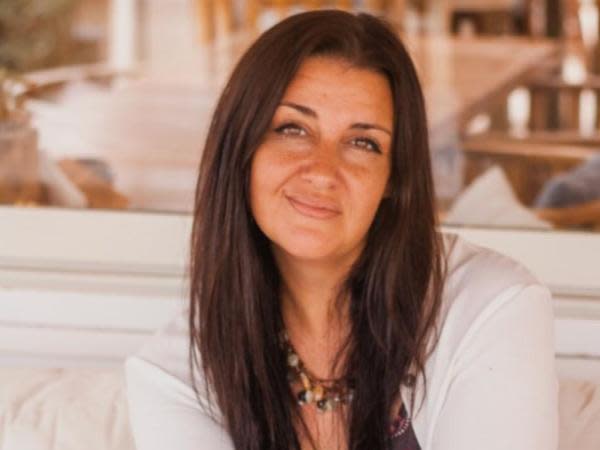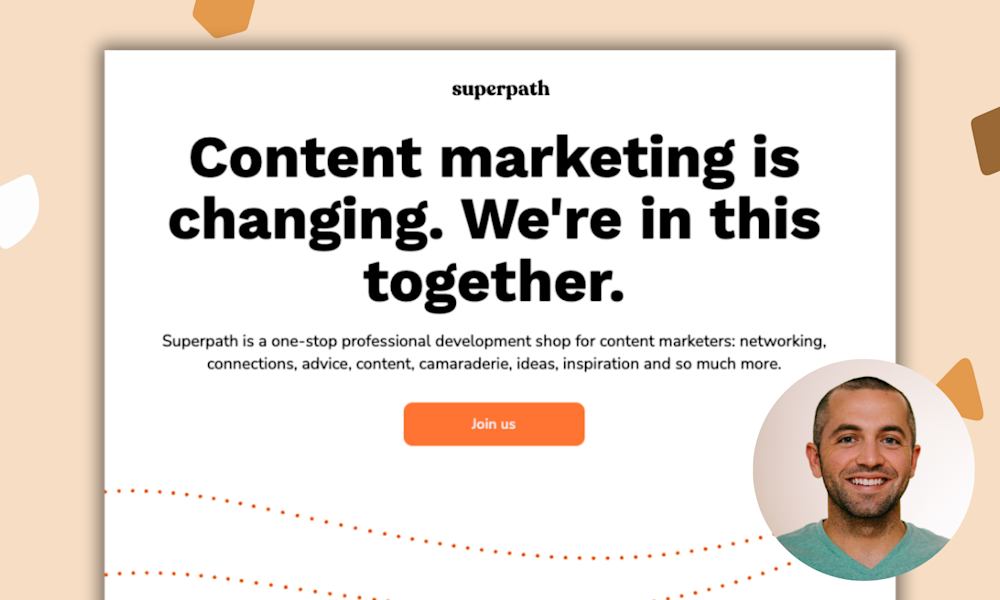On July 17, 2020, Jessica Wilson was diagnosed with stage 3 inflammatory breast cancer. She was 32 years old, with no family history or breast cancer gene.
“I go into my oncologist’s office for my first appointment, and I realize that he doesn’t have the same passion for keeping me alive as I do,” Jessica remembers. “He showed up to my appointment 40 minutes late — no explanation, no apology.”
“Immediately, my brain goes into self-preservation mode. If you don’t seem to care about whether I live or die, and my treatment is in your hands … then I need to make a change. I immediately started speaking up, speaking out to anyone who would listen — to my referring doctor, to the breast surgeon, to everyone — ‘Hey, this isn’t working for me.’”
Her doctor kept pushing a standard course of treatment. “Maybe what I have is not standard,” Jessica thought. “Maybe I need to think outside of this box.”
Soon after, Jessica switched doctors and hospital networks to find a medical team that listened to her. “I firmly believe, had I stayed there, I would not be alive today. I don’t regret it whatsoever,” she says.
The experience sparked a question for Jessica: Who else is going through this?
“Having gone through that experience, it gave me this aha moment: How many people are out here accepting such subpar treatment, either because they don’t know any better or they’re just afraid and they don’t know what to do?”
Jessica knew there had to be other people out there facing similar situations, many of whom might not have the confidence or knowledge to speak up for themselves the way she had.
She wanted to share the lessons she learned from her own experience:
-
You can remain firm in refusing a test or treatment you don’t want, even if your doctor makes you feel like there are no other options.
-
Tell your doctor when you need more time to talk through or think about something.
-
Don’t be afraid to ask a lot of questions — as many as you need to understand what your doctor is explaining to you.
“I sat back and thought, obviously I’ve had to advocate for myself,” Jessica explains. “When you look at life in general, you pretty much have to advocate for yourself everywhere.”
She narrowed her idea down to the three areas where she sees self-advocacy having the greatest impact: Medical, employment, and personal relationships.
With those foci in mind, Jessica launched her coaching business, Advocacy Alley.

Today, Jessica helps members of marginalized groups learn to build confidence and advocate for themselves in every part of their lives. She’s also known as Jess the IE — an “industrial engineer by trade and intuition endorser by passion”.
Alongside a full-time job as an industrial engineer and raising twin daughters, Jessica offers one-on-one coaching and free self-advocacy resources and is working on creating her first online course.
“I work in finance for a major home improvement retailer, and I’m also doing this on the side. Because one I love and one is more of a passion. I’m passionate about making people, processes, and technologies more efficient. And I’m also passionate about folks getting the treatment that they need.”
Keep reading to learn how Jessica used her passion for process improvement — and her Podia site — to launch her coaching career, share her story, and empower others to advocate for themselves.
21 Questions Every Patient Should Ask Their Doctor
Jessica is a successful industrial engineer. She’s a natural logical thinker and complex problem solver. She has a passion for process improvement and knows the power of creating a solid game plan.
So, with the help of a business coach, that’s exactly what she did.
“I have all of these things floating around. How do I tie this up into a neat bow that I can package? Here’s the impact that I’d like to have. What small steps do I need to take to get there?”
Jessica’s first digital product was a free resource: 21 Questions Every Patient Should Ask Their Doctor.
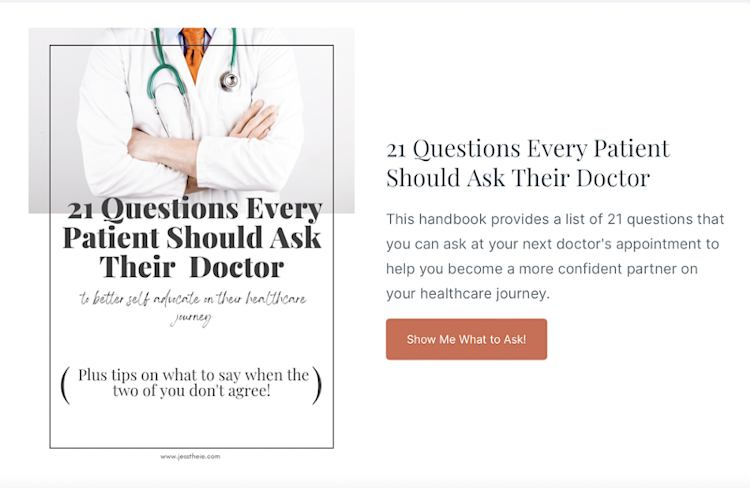
“How do you navigate that delicate area of, ‘I don’t want to be disrespectful, but I also need to be forceful’?” Jessica describes.
“This is my body. This is what I’m willing to accept. This is what I want a second opinion on. It started from there, then I’ve packaged this thing — how do I get it out to the masses?”
Offering valuable free resources is an excellent way for new creators to start building their businesses.
When you make free content a part of your marketing strategy, you establish yourself and your brand as an expert in your niche. You also build an audience interested in your topic and your unique take on it.
To start reaching that audience, Jessica needed a place to host her digital download.
“This could fit my needs. This is something that I can grow into.”
“My business coach actually uses Kajabi,” Jessica says. “Me being me, I’m not just going to buy the first thing that someone tells me about.” As she began to research Kajabi alternatives, she came across Podia.
“I appreciated the price difference … I didn’t have to go all the way to the top tier to have it be suitable for my needs. I liked the flexibility of everything, and [Podia] seemed very user-friendly. I did the 14-day trial, and I thought, ‘Ooh, this is a completely blank canvas. The possibilities are endless.’”
Jessica also knew that she wanted to sell online courses later on, which made Podia’s all-in-one platform an excellent fit for her growing business. “I see Podia and I think, ‘This could fit my needs. This is something that I can grow into,’” Jessica remembers.
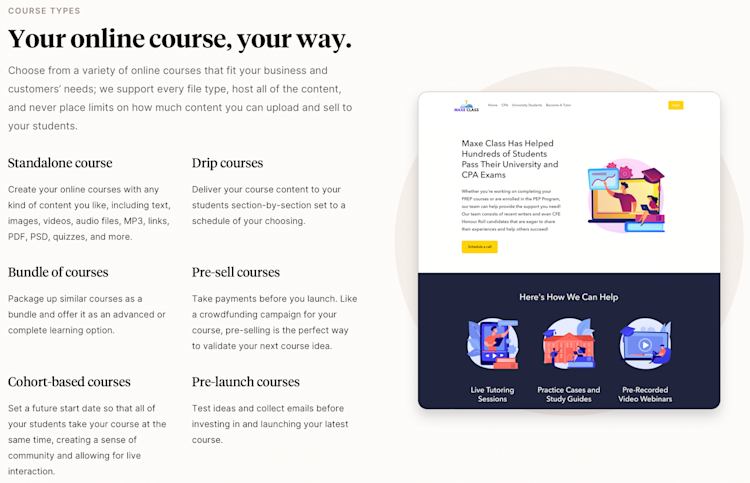
At first, Jessica used Podia to host her free downloads and information about her one-on-one coaching services. As she continued to develop Advocacy Alley, she built her website on Podia, too.
“Over time, it’s continued to grow to where my entire website is [Podia’s] landing pages and sales pages,” Jessica describes.
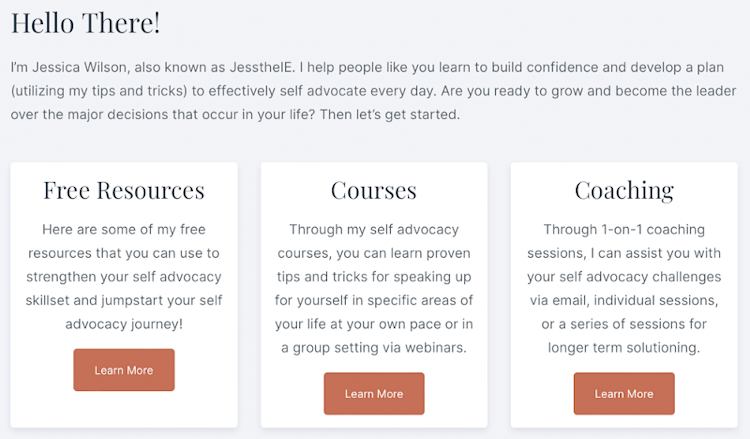
Jessica also started a blog, Beyond the Diagnosis, to share her experience as a young woman battling inflammatory breast cancer.
“The blog is mainly for following along on my breast cancer journey, because I’m not sure if there are places for folks like me, who are diagnosed around the age of 30 — just completely young, just starting your family,” Jessica shares. “What goes through our minds?”

Jessica uses Podia’s course builder to create her blog and share new posts. “The course feature is robust enough to give me what I need. I need to be able to put postings up and then have opportunities for folks to leave commentary,” she says.
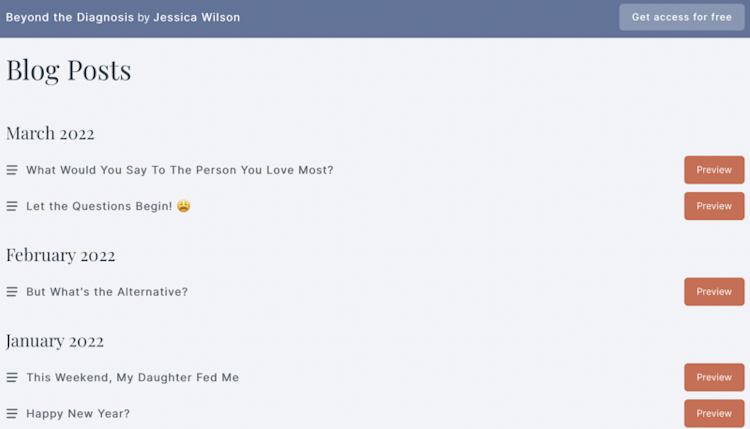
Each blog post is set up as a lesson in Podia. Visitors can read Jessica’s posts right on her Podia site by previewing each lesson and can sign up to leave comments and receive regular updates.
The flexibility of Podia’s all-in-one platform means that Jessica can set up all of the website features she needs.
“There may not be something that on paper literally says what I’m looking for, but I’ve been able to manipulate the system to make it work and meet my needs for everything,” Jessica shares.
See how Podia can work for your creator business. Sign up for a free 30-day trial and get started today.
“I wanted to get courses out there because I wanted to impact the greatest number of people possible.”
Jessica is currently creating her first online course, From Patient to Partner: How to Effectively Self Advocate After a Recent Medical Diagnosis.
The course is geared toward people who have recently been diagnosed and need to figure out next steps — without going down a Google rabbit hole of worst-case scenarios.
“I knew I wanted to have a course for folks to anchor themselves so that their mind doesn’t start wandering, regardless of what the diagnosis can be,” Jessica explains. “Sometimes you just need something to anchor to, something to help guide your steps so that you don’t just spiral.”
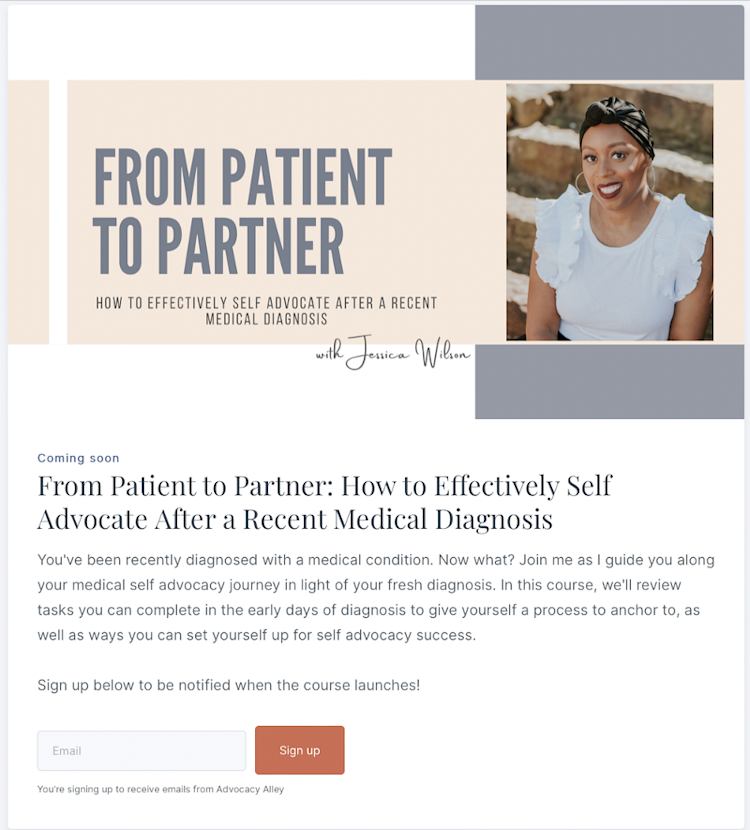
While she plans to continue offering one-on-one coaching, an online course lets Jessica scale her impact and help more people.
“I knew I wanted to get courses out there because I wanted to impact the greatest number of people possible. I can only work with so many people one-on-one and can only handle so many things.
With the course, it’s something that an infinite amount of people can get into at any point in time — whether I’m immediately available to work one-on-one or not — and actually get that same sort of impact.”
Individual patients aren’t Jessica’s only target audience. She also offers corporate packages for health systems and hospital networks looking to improve the way they care for patients from marginalized groups.
Hospitals can sponsor course enrollment for a certain number of patients or hire Jessica as a consultant and work with her directly. “That way, I can have the most impact.”
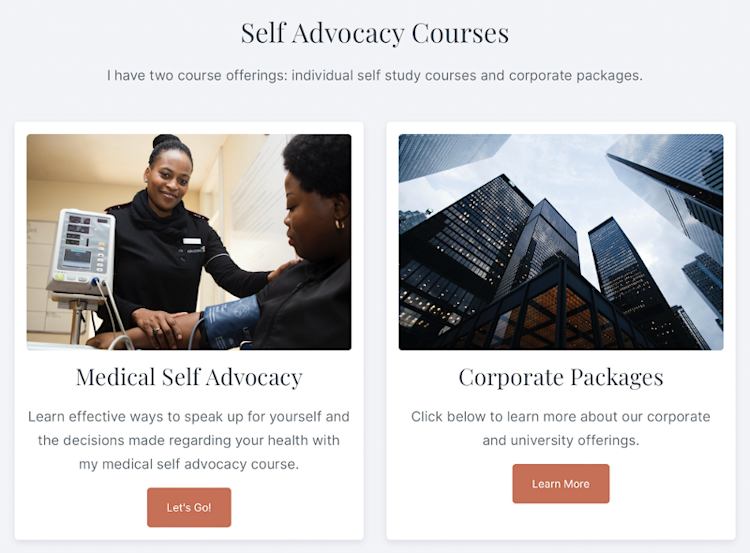
Building an audience: “If you’re not uncomfortable, you’re not growing.”
As she was launching her first products, Jessica also began building her presence on social media platforms so that people could get to know her and follow her journey.
“While you’re still trying to build your email list, you can’t just email folks,” she says. “I also have to still be very present and very visible on social media.”
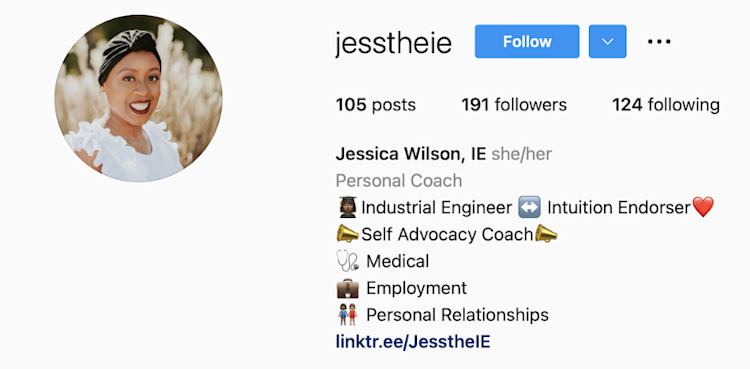
At first, putting herself out there on social media didn’t come naturally.
“Being a creator has forced me to be in front of the camera, to be in the spotlight. And initially, of course, that’s a little bit scary and uncomfortable. But if you’re not uncomfortable, you’re not growing.
So I forced myself to go live with zero people watching, with one person watching — it didn’t matter. It was more of an exercise for me. And if I can do it once, then I can do it a million times. So it was pretty much forcing myself to get comfortable with being uncomfortable.”
As Jessica has become more active and established on social media, she’s been able to find the right platforms and create content that fits her brand and her story.
She explains that coming up with things to say is easy — but creating and posting consistently with a packed schedule can be challenging.
“There are just so many things that I want to share. I don’t think I’ve had any roadblocks with coming up with the content to give to people,” she shares.
“If you’re trying to build a following, they have to see you very often. So to get around that, I started trying to find ways to batch content … Instead of being so long-winded, let’s break [a post] up into three posts. Then I have three out of five posts for the week.”
To other creators who are new to social media for their business, Jessica emphasizes that consistency is key — but that doesn’t mean your posts need to be formulaic.
“You can do your image posts, you can do [Instagram] Reels and be funny, you can do Reels and be serious … just anything to try to diversify how folks can potentially find you,” she recommends.
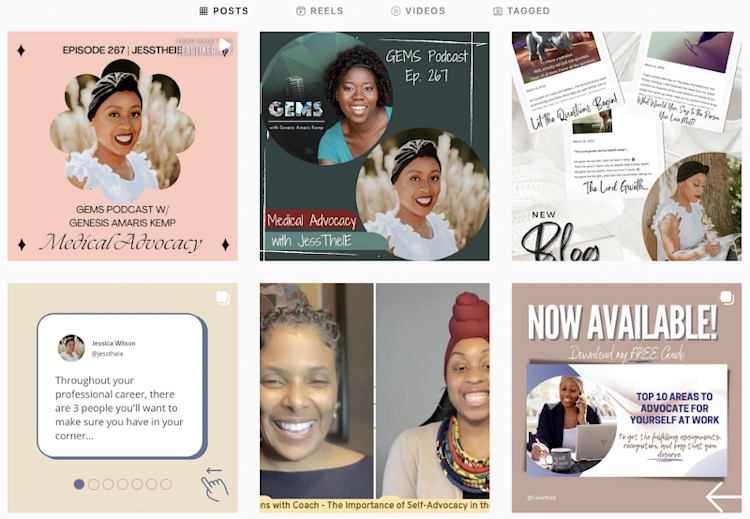
Jessica’s advice for new creators: “Follow your passion, and the money will come.”
As a self-advocacy coach, Jessica knows the importance of building confidence and overcoming self-doubt — and that shows in her advice to new creators.
“Mindset is key. If you start to feel like you’ll never be successful, then you won’t be. There are going to be great days where you’re all the way enthused, and there are going to be days where you’re just like, ‘I just don’t want to.’ And they’re both okay.”
On days when you do run up against a creative block, Jessica recommends looking at other creators’ content for inspiration. And don’t forget to take a break when you need to.
“Take a day and do absolutely nothing related to your business and see if you feel refreshed later,” she recommends.
If you’re a creator who’s just getting started with Podia, Jessica encourages you to take things one step at a time.
“Don’t worry about having an entire beautiful website set up at first. Just worry about those individual pages for each product. Focus on having [those pages] built out first. Then, as your product suite grows, as you grow, as your business grows, you can add additional pages.”
Today, Jessica offers one-on-one coaching, free resources, an online course for individuals and healthcare providers, and three active social media channels — and she’s just getting started.
Remember, the creator journey is a marathon, not a sprint.
“You don’t have to become a millionaire overnight. Follow your passion, and the money will come.”
